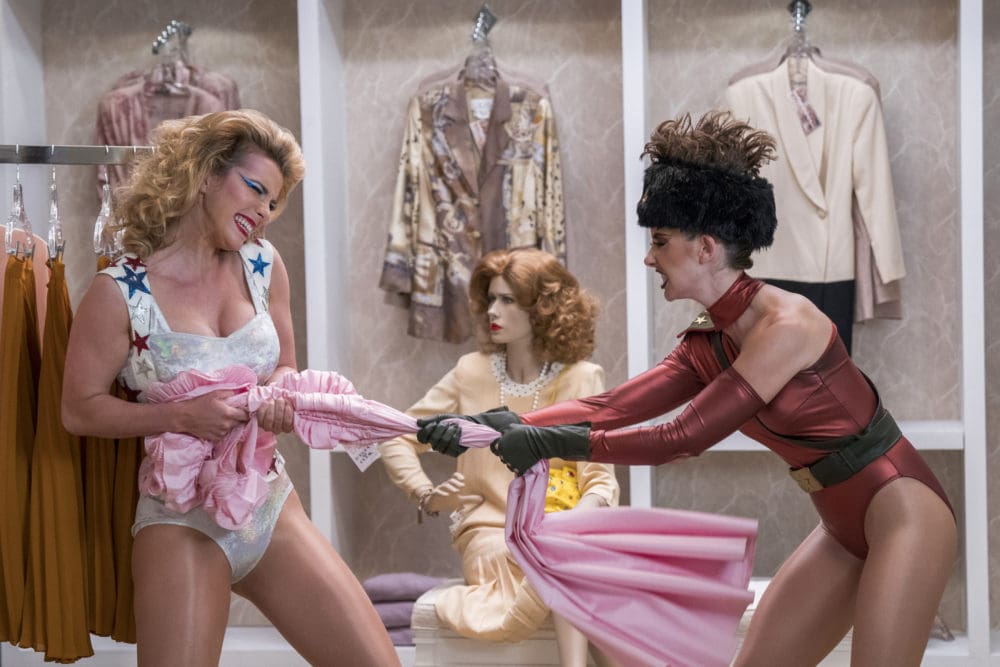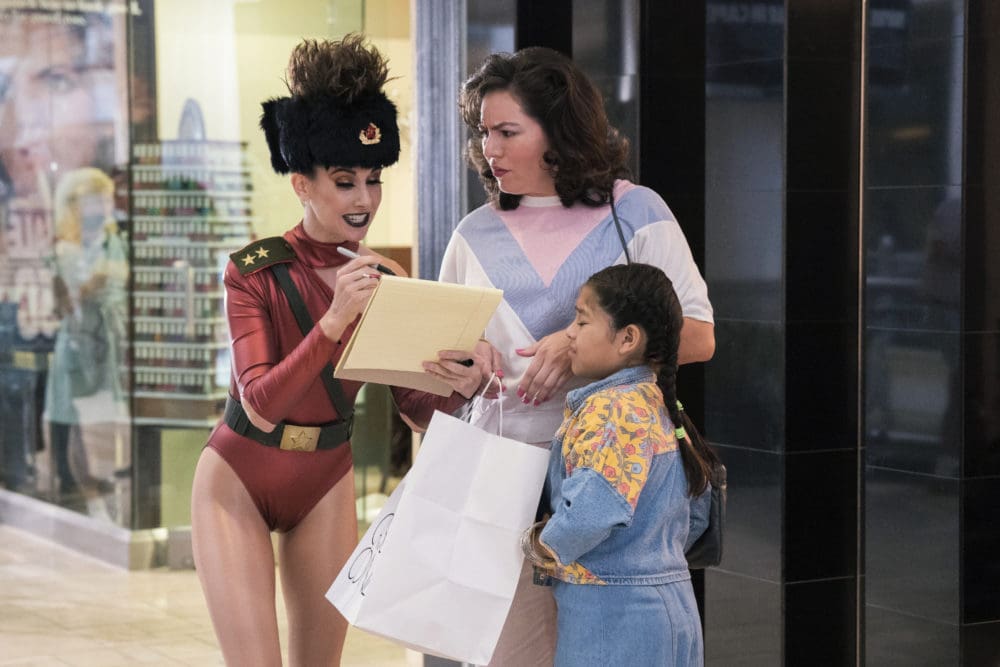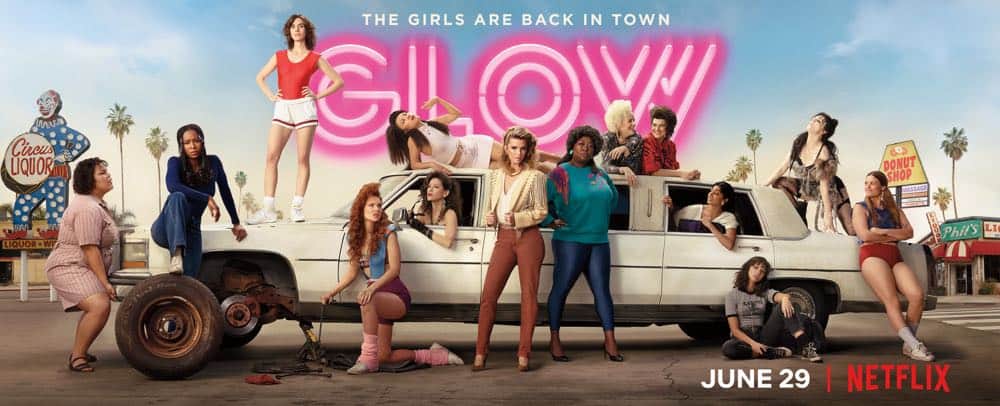If you thought Season One of GLOW was perfect (and I did think it was), then not only is Season Two somehow more perfect, it’s a fully realized version of what the show could be. The first season was the warm up, and season two is the finisher. I am hard pressed to think of any other show that has so perfectly distilled the essence of its subject matter into a compellingly authentic story and done so without compromising a single thing. The wrestling this season is more impressive and more complicated, which leaves absolutely nothing to be desired like it may have for wrestling fans in season one. The storytelling leaves no detail unresolved, and yet leaves every one of them open-ended enough to allow for the viewer’s own interpretation.
I may be getting ahead of myself, but Ruth Wilder (Alison Brie) should absolutely go down as one of the most compelling and authentic female protagonists in television. A common complaint I heard from people back in season one was that Ruth’s personality was grating, her behavior difficult to sympathize with, and her character too unlikeable to root for. It continues to blow my mind that I ever understood those criticisms, because season two’s Ruth is about as likable and sympathetic as a character can be. Her insecurity has been replaced with confidence, her desperation replaced with a stronger sense of self, and her lack of direction with a sense of accomplishment.
It seems like all Ruth needed to find herself was to allow herself to be the bad guy, and she fully shines here as someone who has not only embraced this, but who has been embraced by others as well. Ruth has friends, people who support her and care about her when she gets hurt, which is something Ruth never had before she stopped trying so hard.
She continues to throw herself wherever Debbie (Betty Gilpin) asks in an attempt to make up for what she did to ruin Debbie’s marriage – something Debbie takes full, cruel advantage of, going so far as to sabotage Ruth’s attempt at a love life out of jealousy. As Zoya Ruth is a heel, and the strength to play an unlikable character has allowed Ruth to be herself. As Liberty Belle, Debbie is a face – but Debbie’s behavior out of the ring is anything but wholesome. It’s easy to feel bad for Debbie considering none of what she’s going through was her fault, but it becomes increasingly difficult to sympathize with the way she takes her frustrations out on the people around her, specifically Ruth.

The tension was at such a high boil throughout most of the season that I found it anxiety-inducing and found myself considering how much more of it I could take, but the moment when it finally boils over is incredibly cathartic and one of the most compelling moments of the season. Ruth is barely the same person she was in Season One, and once Debbie accepts that, the chance that they may eventually be able to relate to each other on a personal level again seems a little more likely.
The show reaches its fullest potential in the episode “The Good Twin.” This episode is a straightforward beginning-to-end episode of GLOW – the GLOW that they’re filming within the show. This episode can be a little jarring for anyone in the audience who is completely unfamiliar with the GLOW that the series is based on, but anyone who has watched that will tell you that this episode is about as pitch perfect an impression as they could ever hope to get.
I was almost in tears over how lovingly they recreated the tone of the original, and I was DEFINITELY in tears over how funny they managed to make it. Nearly all the girls make it into the episode, even Ruth (Brie), out of commission but maneuvering around her injury by playing the titular good twin to Zoya, who sets out to foil her evil sister’s scheme. Everyone is able to cut loose here, and a lot of the real-life actors get opportunities to display their passions.
For example, Jackie Tohn (Melrose), who you may or may not remember having been a contest on American Idol, gets not one but two songs. Sunita Mani (Arthie/Beirut), a comedian best known for being a member of “Cocoon Central Dance Team” gets to share a dance sequence with series newcomer and former Jennifer Lopez backup dancer Shakira Barrera (Yolanda). I can’t stress enough how impressively authentic this episode feels, and what a highlight it is during a season that literally doesn’t have a single low point.
While I may have been a little too young to watch the original GLOW during its heyday, I was around for the short-lived follow-up known as WOW, or Women of Wrestling. It, too, aired very late, and the font memories I have of watching that while staying up past my bedtime in the summer hit me with an intense wave of nostalgia during “The Good Twin.”
More so here than in Season One, it feels impossible to be a fan of wrestling and not have a soft spot for this show. It helps you remember why you fell in love with wrestling as a kid, for whatever reason you did. The in-show storylines are over the top just like they always were in those slightly more lawless days of the past, which elicits both a sense of comfort and a shocking wake up call to just how problematic the content we consumed was.
This isn’t emphasized any better than through the Tammé (Kia Stevens) storyline this season. Playing a character called “The Welfare Queen” during the Reagan era is something she was learning how to process before the secret of her new job is compromised by her Stanford University-bound son, who learns during parents’ weekend at Stanford that his mother is playing a racist caricature on television.
The show’s decision to dig deeper into the way non-white characters like Welfare Queen or “Beirut the Mad Bomber” were portrayed in 80’s media – and even still today – was a wise one, and this results in several scenes that are as important to watch in 2018 as they would have been back in 1985.
Tammé is not proud of the character she plays, but she is proud of the strength she learned to find within herself through the role; she is also proud of her idea to profit off her white audience through the sale of self-produced “Welfare Queen” action figures. While Arthie (Mani) fails in her attempt to shed her racist character but ends up finding her own voice, having shed the idea that she needs to worry about what other people think. Cherry (Sydelle Noel) manages to escape “Junkchain” and play a more empowering (and, mostly importantly, self-created) character named “Black Magic.”

As a whole, one of this season’s biggest takeaways is the harsh reality that straight white men had it the best in the 1980’s. Between Tammé and the cast dealing with racist stereotypes, and Ruth (Brie) avoiding sexual assault by the head of the network, only to be reprimanded by her refusal by Debbie (Gilpin), who insists she should have played the game and pretended to enjoy it, this season puts a mirror up to the darker aspects of the culture of the 80’s, while also letting the audience see what a reflection those aspects have on our culture today. We still struggle with the way we portray minorities in media. We have only recently exposed sexual assault and harassment in the workplace. And even for wealthy, white men like Bash (Lowell), the weight of the world is impossible to escape if you’re a gay man in 1985.
One of the most difficult moments in this season lies not in the revelation that Bash is gay – something I’ve anticipated since early in season one – but in the realization that his money and his sheltered rich boy lifestyle was not able to save him from the harsh reality of life as a gay man in the 1980’s. The conclusion to his hunt for his friend, butler, and (implied) lover, who ran off after what Bash insists was a dispute over a paycheck, was so upsetting and so easy not to see coming through all the glitz and glamor of the 80’s LA backdrop 99% of the time that my jaw literally dropped, and stayed dropped. Bash’s desperation to avoid suspicion leads to an impulsive decision that may have worked out in the best interest of himself and Britannica (Kate Nash), but it’s a move that some may see the transparency of at some point down the line. I’m about as heartbroken over Bash’s decisions towards the end of the season as I am worried about him, and Chris Lowell beautifully played every high and low point of Bash’s character with charm, nuance, and emotion.
By the end of the season, every single character has gone on a huge journey whether the show focused on it or not. There are outcomes that may have you thinking, “When did that happen?” but the show so beautifully lays the seeds for these moments throughout, that a re-watch may be necessary to fully appreciate all the small moments between characters. I’m grateful for the show giving every member of its huge ensemble an opportunity to shine, and that no girl gets left behind this season.
Almost everything builds to a head in the second-to-last episode, just in time for the finale episode to be a display of excess and extravagance that has been so clearly earned. The show – both ours and theirs – goes out with a bang, and whatever is in their future, whether it’s continued success and more stories to come or cancellation, I’m confident that GLOW as a whole will go down as one of the most gorgeous and ambitious ideas to come out of television in a long time. If there are future seasons (and I desperately hope there are), I can’t imagine it’ll be easy to outshine this one. And at this point, these actresses who came onto the show without any wrestling expertise have very viable careers in wrestling ahead of them if they want one.
Rating: 10 out of 10


